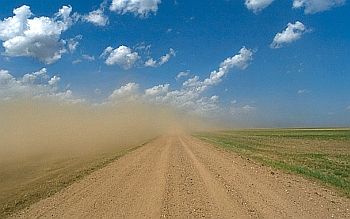
Publisher:
Bonnie King
CONTACT:
Newsroom@Salem-news.com
Advertising:
Adsales@Salem-news.com

~Truth~
~Justice~
~Peace~
TJP
Dec-10-2011 14:02

 TweetFollow @OregonNews
TweetFollow @OregonNews
House Passes Bill Striking Preemptively at EPA's Regulation of Farm Dust
Salem-News.comThe bill was opposed by environmental protection and health policy groups.
 Courtesy: oklahomafarmreport.com |
(BERKELEY, Calif.) - The U.S. House of Representatives on Thursday passed a bill (HR 1633) that would establish a temporary prohibition against revising any national ambient air quality standard applicable to coarse particulate matter in order to limit federal regulation of "nuisance dust" in areas in which such dust is regulated under state, tribal, or local law. Proponents of the bill were concerned about the possibility that the administrator of the Environmental Protection Agency would regulate so-called "farm dust," particulates kicked up in the air during normal farming practices. Opponents of the bill believe the bill's language is too broad and will prevent regulation of harmful pollutants.
The bill was supported by a cross-section of the agricultural community, including the American Farm Bureau Federation, the American Feed Industry Association, the American Seed Trade Association, the Dairy Farmers of America, the National Association of Wheat Growers, the National Renderers Association, the Fertilizer Institute, the National Pork Producers Council, the US Beet Sugar Association, and the USA Rice Federation, as well other interest groups such as the American Motorcyclist Association, the National Federation of Independent Business, and the National Stone, Sand & Gravel Association.
The bill was opposed by environmental protection and health policy groups such as the Natural Resources Defense Council, the American Lung Association, the American Public Health Association, the American Thoracic Society, and the Asthma and Allergy Foundation of America.
Amongst All Members of the House
- Interest groups that supported this motion (Milk & dairy producers, Stone, clay, glass & concrete products, Agricultural chemicals (fertilizers & pesticides), Small business associations, Motorcycles, snowmobiles & other motorized vehicle, etc.) gave on average 3.4 times as much to House members who voted 'YES' ($53,758) as they gave to House members who voted 'NO' ($15,816).
Amongst House Democrats
- Interest groups that supported this motion (Milk & dairy producers, Stone, clay, glass & concrete products, Agricultural chemicals (fertilizers & pesticides), Small business associations, Motorcycles, snowmobiles & other motorized vehicle, etc.) gave on average 4.9 times as much to House Democrats who voted 'YES' ($77,049) as they gave to House Democrats who voted 'NO' ($15,816).
Amongst House Republicans
- House Republicans received on average over 1.5 times as much from interest groups that supported this motion ($50,487) as they received from interest groups that opposed this motion ($32,812). No Republicans voted against the measure.
METHODOLOGY: MapLight analysis of reported contributions to congressional campaigns of House members in office on day of vote, from interest groups invested in the vote according to MapLight, July 1, 2009 - June 30, 2011. Contributions data source: OpenSecrets.org
A link to this data release can be found here.
MapLight is a nonprofit, nonpartisan research organization that reveals money's influence on politics.
Articles for December 9, 2011 | Articles for December 10, 2011 | Articles for December 11, 2011

googlec507860f6901db00.html
Salem-News.com:



Terms of Service | Privacy Policy
All comments and messages are approved by people and self promotional links or unacceptable comments are denied.
[Return to Top]
©2025 Salem-News.com. All opinions expressed in this article are those of the author and do not necessarily reflect those of Salem-News.com.